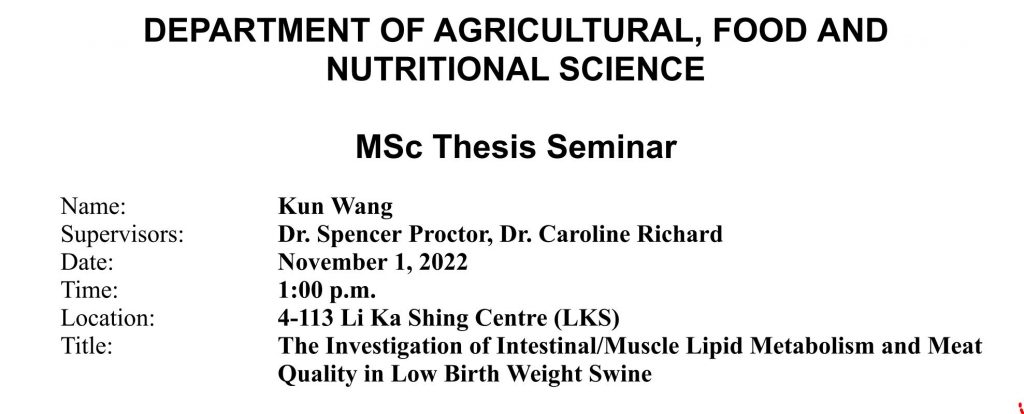
DEPARTMENT OF AGRICULTURAL, FOOD AND
NUTRITIONAL SCIENCE
MSc Thesis Seminar
| Name: | Kun Wang |
| Supervisors: | Dr. Spencer Proctor, Dr. Caroline Richard |
| Date: | November 1, 2022 |
| Time: | 1:00 p.m. |
| Location: | 4-113 Li Ka Shing Centre (LKS) |
| Title: |
The Investigation of Intestinal/Muscle Lipid Metabolism and Meat Quality in Low Birth Weight Swine
|
_______________________________________________________________________
ABSTRACT
Metabolic syndrome and obesity-related complications such as insulin resistance (IR), type II diabetes (T2D) and cardiovascular disease (CVD) have remained a critical worldwide health issue. A previously published study by our group revealed that low birth weight (LBW) piglets exhibited IR and developed preferential intestinal lipid absorption, hypertriglyceridemia and muscle steatosis when fed a high fat (HF) diet compared to normal birth weight (NBW) piglets. For my thesis, we subsequently hypothesized that fatty acid transporters such as CD36, FATP4, FABP2 and/or VAMP7 could potentially explain the development of these observations. Additionally, LBW swine are not often valued in the industry and/or removed from the market due to reduced growth rate and meat quality. It is now well accepted that by manipulating the feed consumption, we can modulate the lipid composition in muscle tissue thereby potentially conferring a human health benefit. At the same time, dairy-derived fatty acids have been shown to provide beneficial effect on IR, which can be potentially incorporated into pork muscle. Dairy ingredients (lactose or whey protein) can also potentially enhance growth performance in weaning piglets. Therefore, the overall aim of this thesis was to investigate the impact of LBW and dairy intake on intestinal and/or muscle lipid metabolism, as well as on postnatal growth, meat quality and carcass traits. At 5-weeks of age, NBW and LBW piglets consumed a 1-week transition diet then were randomly assigned to three experimental diets: 1-chow diet, 2-HF diet or 3-isocaloric HF diet supplemented with 3 servings per 2000kcal/day of full fat dairy products (milk powder, cheese and yogurt) (HF+Dairy). At 12-weeks of age, piglets were euthanized, and carcass, fasting plasma, muscle tissues (longissimus muscle and biceps femoris) and jejunum mucosal scrapings were collected. Results revealed that LBW-HF swine exhibited an early sign of IR (fasting glucose, p<0.05; fasting insulin, p=0.091; HOMA-IR, p=0.086) compared to NBW-Chow, which were ameliorated by dairy intake. Muscle triglyceride content in the LBW-HF group was significantly higher than NBW-Chow group (p<0.05). Dairy intake significantly increased myristic acid (C14:0), DPA (C22:5n3) and tended to increase DHA (C22:6n3) (p=0.092) relative to HF feeding alone in LBW swine. All HF fed LBW swine (regardless of dairy intake) exhibited an upregulation of CD36 expression (but not FABP2) compared with NBW littermates in both small intestine and muscle (p<0.05). Interestingly, LBW swine did not exhibit significant differences in regards to growth performance or overall meat quality (i.e. tenderness, pH, color and carcass yield) compared to NBW counterparts. However, dairy intake significantly increased Canadian Lean Yield % in LBW-HF+Dairy swine compared to LBW-HF and NBW-HF swine (p<0.05).
In summary, findings from this thesis provide new evidence on intestinal/muscle lipid metabolism and meat/carcass quality parameters. We have demonstrated that increased intestinal lipid absorption and preferential muscle lipid deposition in LBW swine can be potentially explained by the upregulation of CD36. Increasing dairy intake can potentially add value to both pork (increasing long-chain PUFA content) and carcass (increasing Canadian lean yield %) quality. Our findings also suggest that LBW pork quality may not be necessarily impaired, which is dependent on LBW phenotype and feeding practice.
———————————————
ALES Graduate Program Administration
UNIVERSITY OF ALBERTA
College of Natural and Applied Sciences
Faculty of Agricultural, Life & Environmental Sciences
T 780.492.4933
